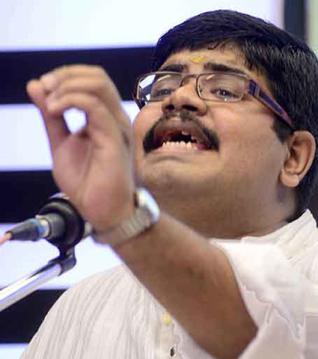
There may have been barely 10 people in the audience; but that did not deter this young man, whose outstanding progress over the past one year had to be seen – rather heard – to be believed. Neyveli Santhanagopalan must be a proud guru today.
The Abhogi varnam and the kalpanasvaram were a brisk warm up. He lost no time to exploit at will the interplay between lyrics, laya and the tune with every successive composition he performed.
The Dikshitar song in Natta, ‘Swaminatha Paripalaya Sumam,’ was an amazing rendition. The excitement was barely tempered by knowledge that it has been sung time and again. Nor could you put down its appeal entirely to familiarity or nostalgia. An early instance was the electrifying improvisation around the phrase ‘Kamitartha Vitarana Nipuna Charana.’
It is often said of the great 19th century composer that his kritis were largely written for recitation on the veena. Surely the piece at issue and a few others beg the question, especially when presented on stage by the likes of young Jayakrishnan.
The next alapana in Sehana was passionate and suffused with emotion. B. Ananthakrishnan (violin) produced some melodious moments that resonated instantly with listeners, by then immersed in the proceedings.
‘Abhi Manamu Kavalenu Talli, Mahishasuramardini,’ the Muthiah Bhagavatar kriti was embellished on the niraval. ‘Stiramuga ni Charanaseva Seyutakai,’ was sung with spontaneity and the kalpanaswaram on the pallavi.
Palpable was the swift change over from the latter song, set in rupaka tala, to Tyagaraja’s popular kirtana, ‘Sarasa Sama Dana Bheda Danda Chathura,’ in Kapinarayani.
At half time in the recital, Jayakrishnan commenced with another immaculate exposition, this time in Purvikalyani. His rendition was powerful.
‘Meenakshi me Mudamdehi,’ was a listener’s delight as much as a devotional rendering. The niraval on ‘Vidhuvidambana Vadane Vijaye,’ bore the stamp of years of authentic learning and craftsmanship.
B. Guru Raghavendra’s mridangam solo earned him commendations from the lead artist, as well as from the listeners.
‘Chandrachooda Sivasankara,’ in Darbarikanada, was a spirited devotional of Purandaradasa’s, which concluded a stupendous performance from the assistant professor of visual communications at the Guru Nanak College.
source: http://www.thehindu.com / The Hindu / Home> Margazhi / by Garimela Subramaniam / December 25th, 2014